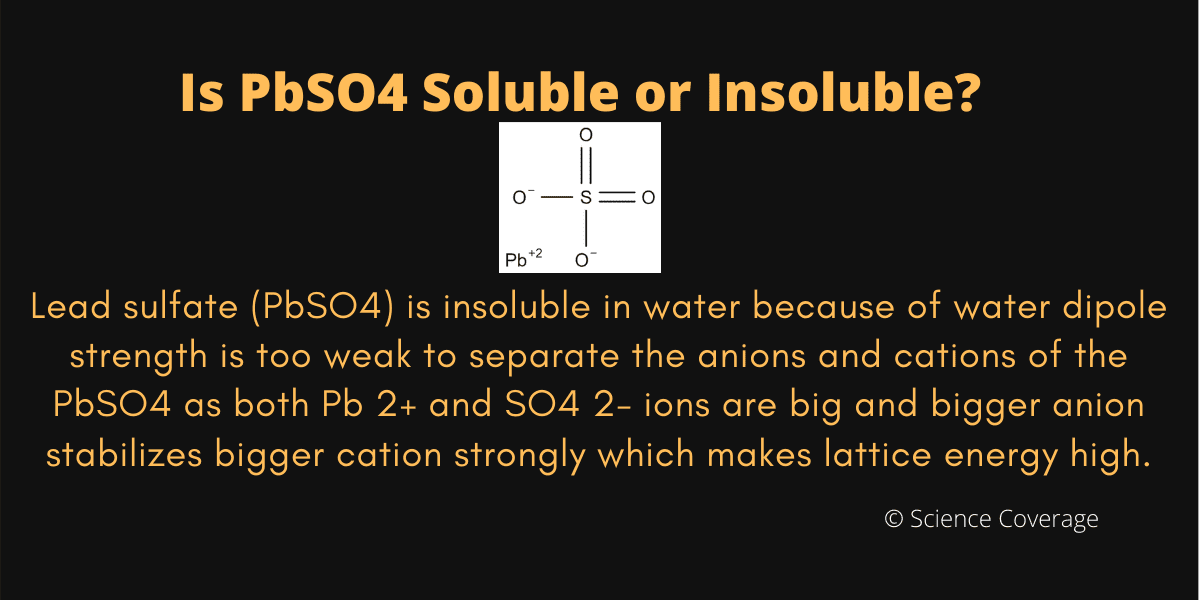Lead sulfate (PbSO4) is insoluble in water because water dipole strength is too weak to separate the anions and cations of the PbSO4 as both Pb 2+ and SO4 2- ions are big and bigger anion stabilizes bigger cation strongly which makes lattice energy high.
Why is PbSO4 insoluble in water?
For compounds to be soluble or insoluble in water, lattice enthalpy and hydration enthalpy are two major aspects. First, we have to know what lattice and hydration enthalpy are,Lattice Enthalpy (Lattice Energy)
In simple terms, Lattice enthalpy is the energy required to
split a compound into its constituent ions i.e. anions and cations. In other
words, it is a cohesive force that needed to bind ions of the compounds either
is in a gaseous state or in solid-state and these are normally called formation
and dissolution lattice energy respectively.
Hydration Enthalpy (Hydration Energy)
Hydration enthalpy is simply defined as the amount of energy
released when one mole of ion combines with a water molecule. In a given
reaction, it has always a negative value as the energy is releasing during the
process which is also known as an exothermic reaction.
Explanation:
Higher the lattice energy, molecule will be less soluble or
have less solubility. And reverse of it, higher the hydration energy, molecule
will be more soluble or have higher solubility.
Now in the case of PbSO4, it has higher lattice energy
because both Pb 2+ and SO4 2- ions are big and we know bigger cations
stabilizes bigger anions more strongly. When it is dissolved in water, its
hydration energy decreases more rapidly than lattice energy.
For any compound to be soluble in water, its lattice enthalpy should be lower and it should decrease more rapidly than hydration energy. But this process is reversed when PbSO4 is placed in water and it is insoluble.
How is PbSO4 insoluble in Water?
As mentioned earlier, hydration energy when the water
molecule binds with ions are not so much stronger which can able to separate
the ions i.e. cations and anions of the PbSO4 molecule, as a result, PbSO4 is
insoluble in water.
We can also identify whether PbSO4 is soluble or insoluble
in water according to the solubility rules which states most of the sulfates
are soluble in water with exception of Ba 2+, Ca 2+, Pb 2+, Ag 2+, and Sr 2+.
Moreover, both solubility and solubility products of PbSO4 are 0.0404 g/100 mL (25 °C) and 2.13×10-8 (20 °C) which are extremely lower values when compared with soluble compounds like NaCl or HBr.
Determining factors for PbSO4 soluble or insoluble
These are some of the relative properties which determine
whether a given compound is soluble or insoluble in different mediums.
Solubility and Solubility Product
Higher the solubility and solubility product of the molecule, more soluble in water. But BaSO4 has very lower solubility (0.0404 g/100 mL) and solubility product (2.13×10-8) which makes it insoluble in water.
Solubility Principle
According to the solubility principle “like dissolves like”
which means a similar type of solute is soluble in a similar type of solvent i.e.
polar molecules are most often soluble in polar solvents and nonpolar are
soluble in nonpolar solvents.
Temperature
Temperature has a very big role in the solubility of the
compounds. When the temperature of the solution increases, solubility also
increases and vice-versa. At room temperature PbSO4 almost insoluble but when
temperature increases, its ions are started separating more, and more and
solubility increases.

Post a Comment